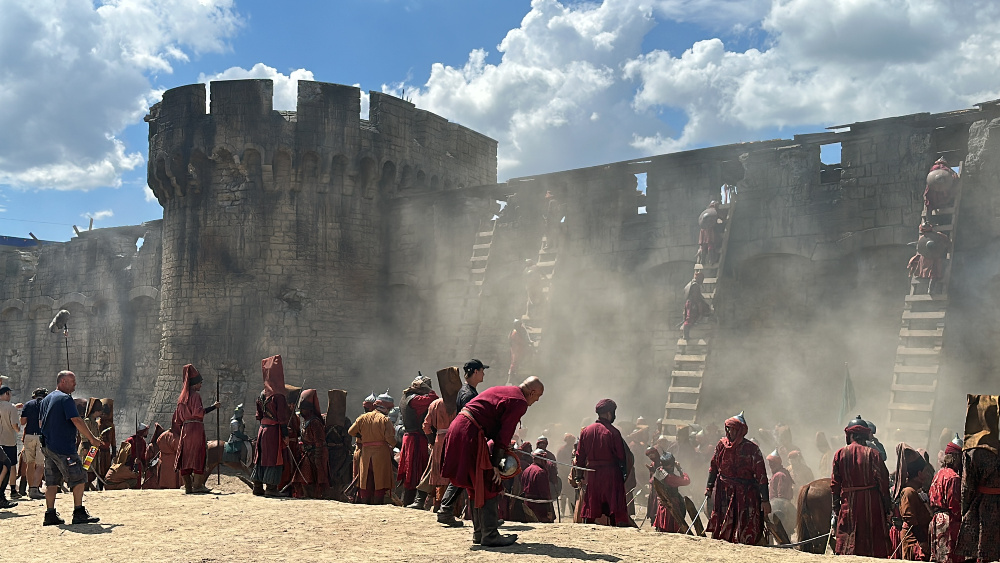Netflix’s “All the Light We Cannot See,” starring Nell Sutton (left) and Mark Ruffalo.
COURTESY OF ATSUSHI NISHIJIMA/NETFLIX
With the resolution of the Hollywood writers strike in September, hopes were high for a return to business as usual in bustling Budapest, host to such recent high-profile productions as Yorgos Lanthimos’ Venice sensation and Oscar frontrunner “Poor Things.” But the sudden breakdown in negotiations between SAG-AFTRA and the AMPTP in early October dampened that enthusiasm.
“We were starting to get momentum back, which was leading us to believe that we would be opening up offices on new shows in early November, on the assumption that the strike would be over by the end of October,” says Adam Goodman of Mid Atlantic Films, which is currently servicing Peacock and Sky’s spy series “The Day of the Jackal.”
Instead, a waiting game is playing out in studios and C-suites across the globe, as actors, talent reps, executives and other industry players not only try to hash out a blueprint for the film and TV business moving forward but plot the next step for the many productions put on pause during the nearly four-month-old strike.
Nevertheless, business in Budapest — the second-largest production hub in Europe, after the U.K. — has proven to be surprisingly resilient. “We have been lucky because we haven’t really stopped,” says Ildikó Kemény, managing director of Pioneer Stillking Films, which provided production services on “Poor Things” and Netflix’s “All the Light We Cannot See,” a limited series starring Mark Ruffalo, Hugh Laurie and newcomer Aria Mia Loberti. “We are constantly budgeting, presenting location and studio possibilities for U.K. and American projects now that the SAG strike’s end is in sight.”
A host of independent productions that received SAG-AFTRA waivers have continued to set up shop in the Hungarian capital, including Pablo Larrain’s Maria Callas biopic “Maria,” starring Angelina Jolie; A24’s “Death of a Unicorn,” starring Paul Rudd and Jenna Ortega; and Lionsgate’s “The Killer’s Game,” starring Dave Bautista and Ben Kingsley. Meanwhile, British TV productions, such as the Eddie Redmayne-starring “Jackal,” which primarily rely on members of the U.K.’s Equity actors union, have brought a steady flow of business to the Magyar biz.
“Poor Things” producer Ed Guiney, of Dublin-based Element Pictures, points to a number of attractive selling points that made Budapest the best option for Lanthimos’ madcap coming-of-age tale. Among them were a host of large soundstages available for the production’s nearly three-month shoot, a world-class crew base, competitive production costs and a 30% cash rebate.
Combined, those factors allowed the Greek auteur to fully realize his daring creative vision for the film. “Shooting in Hungary allowed us to really push the envelope,” says Guiney. “The economics of it meant that we could probably be bolder about some of the things we wanted to do.”
Last year, Hungary hosted more than 300 productions and generated a record-breaking $690 million in total value for the country, a 20% jump from 2021. But, however robust the optimism among industry players for a return to the status quo once the SAG strike is resolved, those numbers are sure to take a hit in 2023.
“The first half of the year was exceptional, with three months at 100% occupancy and the remaining months exceeding 90%. However, since early June, half of the studio, encompassing four stages, remains unoccupied,” says Mihály Tóth of Origo Studios, which is currently hosting Max’s series “Dune: The Sisterhood.” “We’ve been renting out the vacant stages to independent films and commercials, albeit not at full capacity. This strategy helped mitigate our revenue losses.”
The outlook for 2024, however, remains uncertain, with Tóth noting that “inquiries for next year remain notably subdued.”
Nevertheless, Origo utilized the slowdown to carry out refurbishments and upgrades, such as replacing LED lights on its largest soundstage, building a new lighting warehouse and unveiling an 11th stage in October. Meanwhile, the long-awaited expansion of the state-owned NFI Studios at Fót, on the outskirts of Budapest, is set to unveil four new soundstages early next year that will boost the studios’ capacity five-fold, to more than 135,000 square feet.
Filming of Beta Cinema’s epic series “Rise of the Raven” takes place at Hungary’s NFI Studios.
Courtesy of NFI Studios
The studio has remained fully operational throughout the expansion, playing host to Netflix’s fantasy epic “The Witcher” and the streamer’s historical drama “The Last Kingdom,” as well as Beta Cinema’s big-budget Hungarian epic drama series “Rise of the Raven.” “We have been operating the NFI Studios at full capacity throughout the construction and fortunately, there is already great interest in the new studios,” says studio head Ildikó Kovács.
Whatever uncertainty hangs over Budapest for the near future, the industry’s long-term prospects remain strong, and the scramble for soundstages will surely begin once the SAG-AFTRA strike is finally resolved, says Mid Atlantic’s Goodman, comparing the expected logjam to the rush for studio space after the industry emerged from COVID lockdowns.
“Our messaging to the studios as the international producers is that, because there will be a rush to production, those that are in the best position to make a financial commitment … ahead of competing shows will get the footprint they want, they’ll get the stages they want, they’ll get the crew that they want,” he says. “The moment actors are available to work, there’s going to be more shows than many towns can support, not least of all Budapest.”
Checkout latest world news below links :
World News || Latest News || U.S. News
The post ‘Poor Things’ Host Hungary Anticipates Continuing Production Boom After SAG-AFTRA Strike Settles appeared first on WorldNewsEra.

